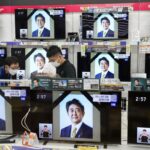
BEIRUT (AP) — Lebanon’s parliament speaker on Tuesday summoned lawmakers for a session this week to elect the country’s next president, offering a glimmer of hope of a political step forward even as chaos roils this Mideast nation.
Parliament is to convene on Thursday, according to a memo from the speaker, Nabih Berri. Under Lebanon’s fragile sectarian power-sharing system, the country’s 128-member parliament votes for a president, who must be a Maronite Christian.
The six-year term of incumbent President Michel Aoun — a retired military general and an ally of Iran-backed militant Hezbollah group who was elected in October 2016 following a two-year stalemate — ends on Oct. 31.
Aoun’s successor is to be elected at a time when Lebanon is going through an economic meltdown and the government struggles to implement structural reforms required for a bailout from the International Monetary Fund.
The crisis, which started in late 2019, has plunged three-quarters of the tiny Mediterranean nation into poverty and the Lebanese pound has lost 90% of its value against the dollar.
However, it is unclear whether legislators in a deeply divided parliament will be able reach a quorum for the session, raising prospects of renewed political paralysis.
In recent months, no majority or consensus candidate has emerged for the post of Aoun’s successor.
Sleiman Frangieh of the Marada Party, an ally of Hezbollah who calls Syrian President Bashar Assad a “friend and brother,” has the backing of some key parties but hasn’t received the backing of a major Christian bloc.
The other announced candidates, Tracy Chamoun, the granddaughter of a former Lebanese president running on an anti-Hezbollah platform, businessman Ziad Hayek, and writer and women’s advocate May Rihani have yet to receive any formal endorsements.
Hezbollah’s opponents, backed by the United States and Gulf Arab monarchies, are hoping to use their influence to ensure that Lebanon’s next president is not an ally of Hezbollah. Separately, 13 independent reformist lawmakers are lobbying to try to push for a reformist president who would prioritize reforms and pull Lebanon out of the quagmire.




